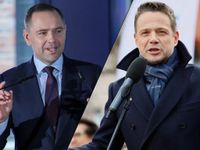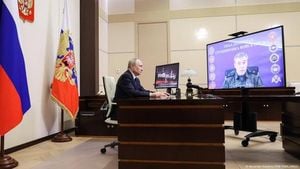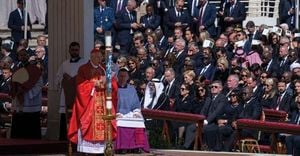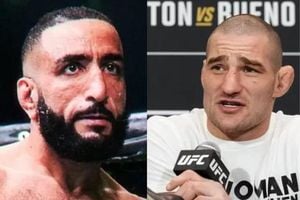As the Polish presidential election approaches, the political landscape has become increasingly contentious, particularly surrounding the organization of a televised debate. Szymon Hołownia, a candidate from the Third Way coalition, has vocally criticized the proposal for a debate featuring only the two leading candidates, insisting that public broadcaster TVP has a duty to include all candidates in the election.
Hołownia, whose polling numbers hover around 5-6%, expressed his concerns through his campaign manager, Jacek Cichocki. On April 10, 2025, Cichocki sent a letter to Tomasz Sygut, the general director of TVP, urging him to extend invitations to all candidates participating in the presidential race. "TVP cannot limit the debate to only two candidates," Cichocki emphasized, asserting the necessity for inclusivity in the electoral process.
Alongside Hołownia, candidates Magdalena Biejat and Krzysztof Stanowski have also confirmed their intention to participate in the debate. In contrast, Sławomir Mentzen, representing the Confederation, and Adrian Zandberg have opted out, with Mentzen notably stating, "I am running seriously" and expressing disdain for the debate format being proposed.
The debate is scheduled to take place in Końskie, a location that carries historical significance. Five years ago, Rafał Trzaskowski, the candidate from the Civic Coalition, did not attend a debate held there against incumbent President Andrzej Duda. This absence was exploited by TVP, which highlighted his non-participation to undermine his campaign. The narrow margin in that election—Duda won with 51.03% to Trzaskowski's 48.97%, a difference of just 211,194 votes—has made the significance of debates even more pronounced in the current election cycle.
As the debate date approaches, logistical arrangements have been a point of contention. Journalists from Wirtualna Polska reported that the venue for the debate, a sports hall in Końskie, was rented by Dom Mediowy AM Studio, a company that has previously worked with Donald Tusk's political party. Trzaskowski's campaign team confirmed their role in organizing the hall rental and ensuring the necessary preparations were in place, while TV stations are responsible for technical aspects such as cameras and sound.
Despite the preparations, TVP has officially stated that it is not the organizer of the debate. In a brief response, the broadcaster clarified, "Telewizja Polska is not organizing this debate. The costs are being covered by Rafał Trzaskowski's campaign." This statement has raised eyebrows, as the electoral code mandates that TVP must conduct debates among candidates. Article 120 of the Electoral Code stipulates that public television is required to facilitate debates among registered candidates, ensuring fairness and transparency in the electoral process.
Legal experts have weighed in on the implications of the debate's organization. Anna Frydrych-Depka, a lecturer at Nicolaus Copernicus University, pointed out that if a debate only features one candidate, it does not fulfill the legal definition of a debate under Polish law. "A debate must involve at least two candidates; otherwise, it cannot be considered a legitimate debate," she explained. Frydrych-Depka further noted that public broadcasters cannot use public funds to promote a single candidate, emphasizing the importance of equal opportunity in electoral discussions.
In a parallel development, Telewizja Republika announced its own debate, set to occur at 6:50 PM on the same evening as the main event. This has led to further complications as Karol Nawrocki, the candidate supported by the ruling Law and Justice party (PiS), has indicated his willingness to participate in the debate with Trzaskowski, but only if all media outlets are allowed to cover the event.
Mentzen, who has refused to attend the Końskie debates, criticized both Nawrocki and Trzaskowski for what he perceives as a lack of seriousness in their approach to the electoral process. He expressed frustration over being excluded from the debates, stating, "I want to talk in normal conditions, at a previously agreed time, without begging to participate in a debate I am not invited to." Mentzen has instead committed to attending a debate organized by Telewizja Republika on April 14, 2025, where he hopes to engage in a more structured dialogue about Poland's future.
Amidst this backdrop, other candidates are also voicing their intentions to participate in the Końskie debates. Hołownia has announced his plans to attend both the TVP debate and the one organized by Telewizja Republika, asserting that he will not allow half of Poland to be excluded from the electoral process. Biejat echoed this sentiment, proposing a second debate to further discuss their visions for the country.
The situation in Końskie has become a focal point for the election, with various candidates positioning themselves in relation to the unfolding debate drama. As the date draws near, the implications of how these debates are structured and who is included will undoubtedly influence voter perceptions and the overall electoral outcome.
In conclusion, the upcoming debates in Końskie encapsulate the tensions and complexities of the Polish presidential election. With candidates divided over the format and participation, the events are set to serve as a litmus test for the democratic process in Poland, highlighting the critical need for transparency and inclusivity in political discourse.
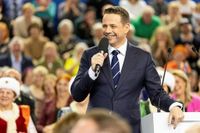
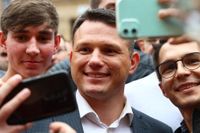
![Polityczny spektakl w Końskich. Ruszyła pierwsza debata [RELACJA NA ŻYWO]](https://thumbor.evrimagaci.org/fOCNyn5OTiV_DQXnJBQf8x9qwp0=/200x0/tpg%2Fsources%2Fa2623081-37cf-4e1f-9688-0c499bf6b9d8.jpeg)
